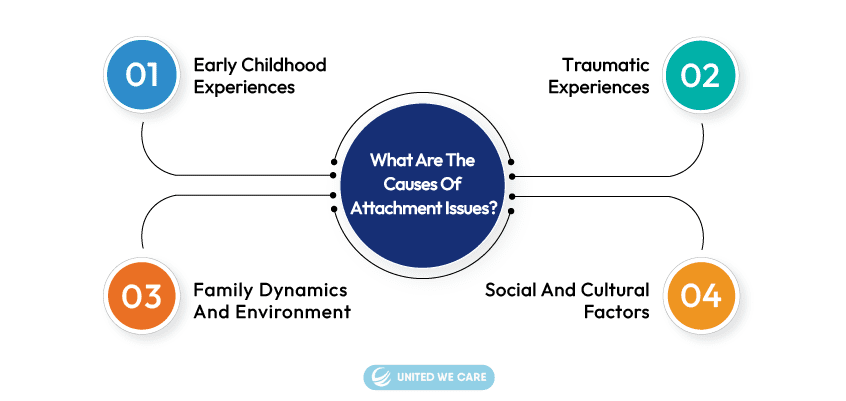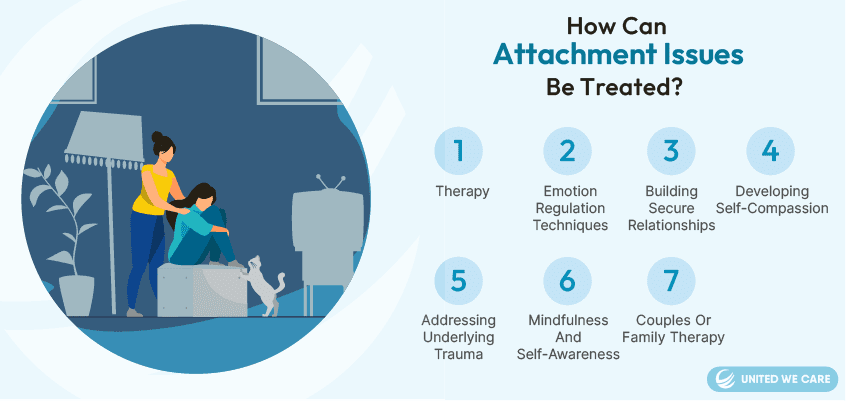Introduction
Attachment issues refer to challenges that can make it challenging for individuals to form connections with others. These challenges encompass a fear of being abandoned, difficulty in trusting others, and struggles in developing relationships. Dealing with issues requires understanding and support to facilitate the healing and growth process.
What Are the Attachment Issues?
Are you experiencing a recurring pattern of relationship failures? Do you often question whether you’ll ever be able to establish fulfilling and close connections? Attachment issues generally comprise difficulties that can significantly impact an individual’s ability to form and maintain healthy emotional bonds. These issues often stem from insecure childhood attachments, traumatic experiences, or negative relationship patterns.
Individuals grappling with issues may encounter difficulties when it comes to trusting others, harboring a fear of abandonment, experiencing detachment, or exhibiting clinginess and neediness in relationships. The combination of these challenges can lead to a cycle of unsatisfying connections, leaving individuals feeling isolated, anxious, or overwhelmed.
Addressing the complexities associated with issues involves therapy aimed at healing wounds and traumas.
Therapy can involve exploring experiences of forming attachments, recognizing patterns in behavior and thought, and devising strategies to establish secure and fulfilling connections.
Engaging in self-reflection, increasing self-awareness, and seeking support can be beneficial for individuals grappling with issues. These steps may assist them in cultivating relationships and fostering a sense of security, satisfaction, and meaningful connections with others. Ultimately, this promotes well-being and personal growth.
Read more about Anxious attachment.
What Are Some Symptoms of Attachment Issues?
Attachment issues can manifest in ways such as;
- Having a fear of being abandoned or an intense desire to avoid being alone may lead to clinginess, possessiveness, and difficulty tolerating separation from loved ones.
- Struggling to form and maintain relationships due to feelings of self-worth and lack of trust.
- Feeling insecure, constantly needing reassurance, experiencing self-doubt along with a fear of rejection.
- Employing detachment. Shutting down as a defense mechanism to shield oneself from potential hurt or rejection.
- Difficulty expressing emotions or being emotionally vulnerable, which may result in suppressing feelings or having outbursts.
- The development of patterns of codependency or heavy reliance on others can lead to imbalances in relationships, causing individuals to experience feelings of loneliness, isolation, or worthlessness within those relationships.
- High levels of anxiety or distress can trigger reactions and a fear of abandonment when relationships are threatened or come to an end.
More information about what causes mommy Issues in women
What Causes Attachment Issues?
Attachment issues can be attributed to factors which can be categorized as follows:
1. Early Childhood Experiences:
- Separation, neglect, and abuse from parents or primary caregivers during childhood.
- Unpredictable caregiving makes it difficult for a child to trust others and form attachments.
- Parental substance abuse and Mental health issues that hinder parents’ ability to provide emotional support.
2. Traumatic Experiences:
- Loss, abandonment, or significant life changes that have a lasting impact on patterns.
- Childhood experiences of bullying, rejection or difficulties in peer relationships shaping attachment patterns later in life.
3. Family Dynamics and Environment:
- Divorce of parents, frequent relocations, or unstable living situations affect the formation of attachments.
- Genetic and biological factors also play a role in vulnerability and the development of attachment patterns. If parents or primary caregivers are experiencing challenges in forming bonds with their child, it can impact the child’s upbringing. There is a likelihood that the child will inherit these attachment patterns.
4. Social and cultural factors play a role:
- Factors such as norms and cultural values influence how much importance is placed on connections and the availability of support systems.
- Long-term illness, hospitalization, or extended periods of separation during stages of development can have effects.
Understanding the root causes enables support and interventions to promote healing and foster healthy attachment patterns.
Must read Attachment Styles
How Can Attachment Issues Be Addressed?
There are treatment approaches for addressing attachment issues. These include:
Therapy: types of therapy such as trauma-focused therapy and individual therapy can be beneficial for individuals struggling with difficulties. These therapies aim to explore childhood traumas, gain insight into patterns, and teach healthier relationship skills.
Emotion regulation techniques: Learning and practicing techniques to regulate emotions can help individuals manage their feelings better. This approach aids in addressing difficulties associated with issues.
Building relationships: Numerous support groups are available to assist individuals dealing with issues.
Must Read: Importance Of Trust In A Romantic Relationship
Engaging in group activities and building relationships with individuals can be beneficial for healing and developing attachment styles.
To heal from wounds, it is important to practice self-compassion and self-care. These practices enhance self-worth. Contribute to relationships.
Addressing trauma is crucial. Therapies like Eye Movement Desensitization and Reprocessing (EMDR) or Cognitive Behavioral Therapy (CBT) can help identify and heal the traumas that may have caused issues, especially if they originated from childhood experiences.
Practicing mindfulness and self-awareness can aid in recognizing patterns, identifying triggers, and responding to relationships in a manner.
When attachment issues affect relationships, couples therapy or family therapy can be beneficial. These therapies improve communication, build trust, and create an environment for the relationship to thrive.
More Information about Dealing with Mommy Issues in Relationship
How Can Attachment Issues Be Treated?
- Therapy: types of therapy such as trauma-focused therapy and individual therapy can be beneficial for individuals struggling with difficulties. These therapies aim to explore childhood traumas, gain insight into patterns, and teach healthier relationship skills.
- Emotion regulation techniques: Learning and practicing techniques to regulate emotions can help individuals manage their feelings better. This approach aids in addressing difficulties associated with issues.
- Building relationships: Numerous support groups are available to assist individuals dealing with issues. Engaging in group activities and building relationships with individuals can be beneficial for healing and developing attachment styles.
- Developing self-compassion: To heal from wounds, it is important to practice self-compassion and self-care. These practices enhance self-worth. Contribute to relationships.
- Addressing underlying trauma: Addressing trauma is crucial. Therapies like Eye Movement Desensitization and Reprocessing (EMDR) or Cognitive Behavioral Therapy (CBT) can help identify and heal the traumas that may have caused issues, especially if they originated from childhood experiences.
- Mindfulness and self-awareness: Practicing mindfulness and self-awareness can aid in recognizing patterns, identifying triggers, and responding to relationships in a manner.
- Couple or Family Therapy: When attachment issues affect relationships, couples therapy or family therapy can be beneficial. These therapies improve communication, build trust, and create an environment for the relationship to thrive.
Know More About the Difference Between Mommy Issues vs Daddy Issues
Conclusion
Attachment issues often arise from childhood experiences, trauma or inadequate caregiving by parents or primary caregivers. This makes it challenging for individuals to form or maintain bonds.
However, it is possible for individuals facing challenges to find healing and personal growth with the assistance of therapy, introspection, and the development of relationship patterns. By addressing childhood traumas and wounds, cultivating self-awareness, forming connections with others, and nurturing satisfying relationships, individuals can overcome attachment issues.
United We Care is a platform dedicated to promoting well-being. It offers support and resources specifically tailored to those struggling with issues. Through programs and a compassionate community, United We Care strives to facilitate healing, encourage growth, and empower individuals to establish secure and fulfilling relationships. The platform aims to create an environment where individuals can seek guidance and access tools that will help them overcome challenges while enhancing their overall well-being.
Explore Our Self-paced Courses
References
[1] L. Amy Morin, “Signs and causes of attachment issues,” Verywell Mind, 15-Feb-2019. [Online]. Available: https://www.verywellmind.com/what-is-an-attachment-disorder-4580038. [Accessed: 16-Jul-2023].
[2] Masterclass.com. [Online]. Available: https://www.masterclass.com/articles/attachment-issues. [Accessed: 16-Jul-2023].
[3] L. Morales-Brown, “Attachment disorder in adults: Symptoms, causes, and more,” Medicalnewstoday.com, 30-Oct-2020. [Online]. Available: https://www.medicalnewstoday.com/articles/attachment-disorder-in-adults. [Accessed: 16-Jul-2023].
[4] C. Raypole, “Attachment disorder in adults: Styles, tests, and treatment,” Healthline, 19-Feb-2019. [Online]. Available: https://www.healthline.com/health/attachment-disorder-in-adults. [Accessed: 16-Jul-2023].
[5] Zencare.co. [Online]. Available: https://zencare.co/mental-health/attachment-issues. [Accessed: 16-Jul-2023].
[6] “Reactive attachment disorder,” Mayo Clinic, 12-May-2022. [Online]. Available: https://www.mayoclinic.org/diseases-conditions/reactive-attachment-disorder/diagnosis-treatment/drc-20352945. [Accessed: 16-Jul-2023].












